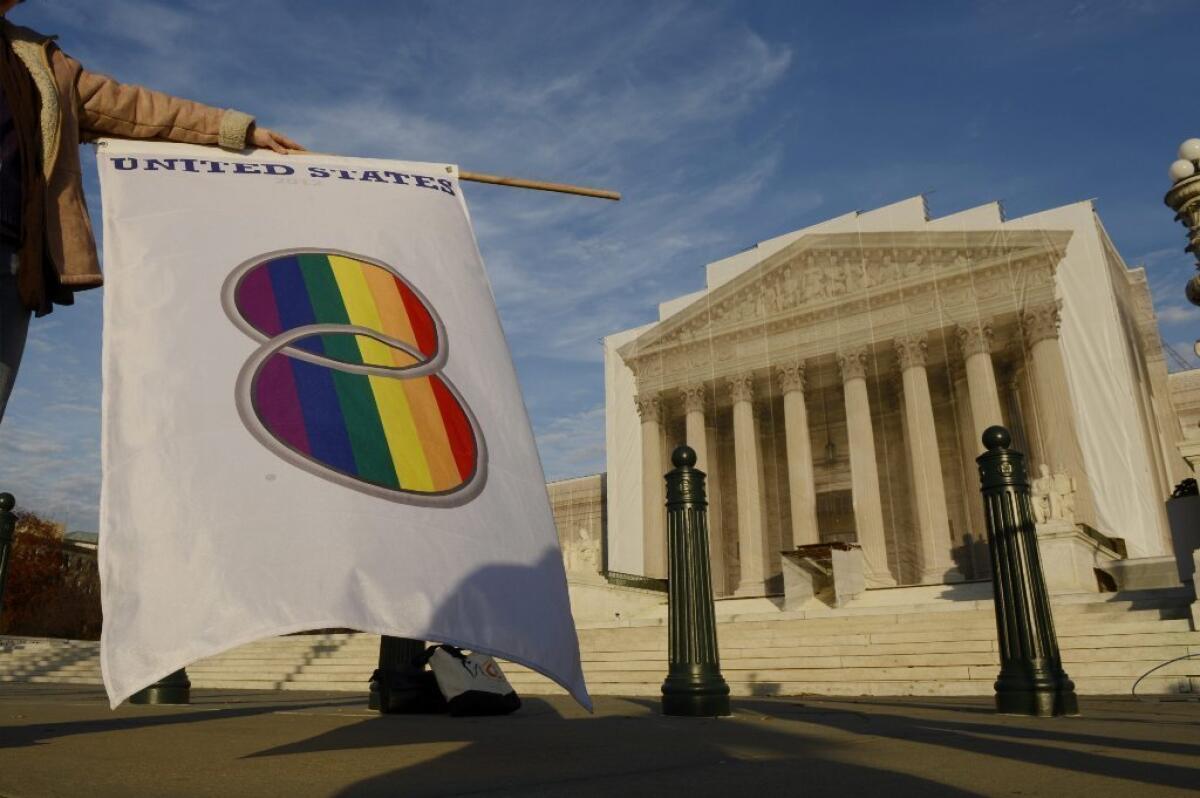Same-sex marriage meets the high court

- Share via
On Nov. 6, for the first time in American history, a majority of voters in a state — indeed, in three states — approved same-sex marriage. On Friday, the Supreme Court decided to weigh in on the issue, granting review in cases challenging the constitutionality of the Defense of Marriage Act and in a case contesting the constitutionality of California’s Proposition 8, which barred same-sex marriage.
DOMA is likely to prove the easier issue for the court, assuming the justices rule on the merits of either or both cases (there are procedural issues that, depending on how the justices are inclined, could block them from considering the merits). The relevant statutory provision bars congressional recognition of same-sex marriages lawfully performed in the states. This means, for example, that a same-sex couple lawfully married in Massachusetts is disqualified from receiving Social Security survivors’ benefits that are available to married opposite-sex couples.
Several lower courts have invalidated DOMA on federalism grounds. Historically, Congress has usually deferred to state definitions of marriage. Supreme Court justices who care deeply about preserving traditional spheres of state autonomy ought to be troubled by DOMA, regardless of what they think of marriage equality. Conservative justices who prize federalism and liberal justices who endorse marriage equality may combine to invalidate DOMA by a sizable margin.
Indeed, for the court to uphold DOMA in 2013 would be surprising. Some sponsors of that law, enacted in 1996, defended it in blatantly homophobic terms, denouncing homosexuality as morally wrong and comparing it to polygamy and pedophilia. Supreme Court precedent forbids statutes to be rooted in animus or prejudice, and to a considerable degree DOMA was.
In addition, justices are not indifferent to public sentiment, and recent opinion polls show that Americans no longer support DOMA. One 2011 poll revealed that Americans favored its repeal by 51% to 34%. Even lower-court judges appointed by Republican presidents have been voting to strike down DOMA.
Predicting how the court will rule on the Proposition 8 case, which could clearly establish or deny a constitutional right to same-sex marriage, is harder. For starters, the justices are likely to divide 5 to 4, as they do on almost every important constitutional issue — including abortion, affirmative action, campaign finance reform, capital punishment, gun control and federal healthcare reform.
As on most other issues, Justice Anthony M. Kennedy, probably the most powerful justice in the court’s history, is likely to determine the outcome. His vote may turn on how he balances two seemingly opposing proclivities. On the one hand, Kennedy’s rulings often turn dominant national norms into constitutional mandates to suppress outlier state practices. His decisions barring the death penalty for minors and the mentally disabled and invalidating state laws criminalizing same-sex sodomy fit this description.
On gay marriage, this propensity to use the Constitution only to suppress dissident practices would counsel restraint on the part of the court. Just nine states and the District of Columbia currently permit same-sex marriage. Intervening at this stage of a social reform movement would be somewhat analogous to Roe vs. Wade, in which the court identified an abortion right that invalidated the laws of 46 states. Kennedy has rarely if ever used the Constitution so aggressively.
On the other hand, Kennedy authored the court’s only two decisions supporting gay rights, explicitly embracing the notion of a living Constitution whose meaning evolves to reflect changing social mores. Moreover, Kennedy’s opinions frequently treat international norms as relevant to American constitutional interpretation, and marriage equality is rapidly gaining momentum around the world.
Finally, language in some Kennedy opinions suggests an attentiveness to historical legacy, and the handwriting on the wall on marriage equality is crystal clear. Support among Americans has increased from less than 25% in 1990, to 30% to 35% in 2004, to more than 50% today. In addition, polls show that 70% of Americans aged 18 to 29 support gay marriage, and that is unlikely to diminish as these people age.
Many state legislators have explained their votes in favor of gay marriage on the ground that they wanted to be on the right side of history and to have their children be proud when reflecting on their parent’s legislative record. Judges authoring opinions in support of gay marriage have frequently invoked examples of courts being on the right side of history. Chief Justice Margaret Marshall, the author of Massachusetts’ pioneering gay-marriage ruling, has compared it to that court’s 1790s ruling that barred slavery under the very same constitutional provision. Similarly, the California Supreme Court’s decision in favor of gay marriage proudly invoked its landmark 1948 ruling that invalidated a state ban on interracial marriage.
In 1954, the court’s ruling in Brown vs. Board of Education, which invalidated racial segregation in public schools, split the nation in half. Within two decades, however, it had become iconic. A high court ruling in favor of marriage equality would similarly divide the nation in 2013. Yet, given how quickly public opinion is evolving, within a decade or so such a decision would probably also be almost universally applauded. What justice would not be tempted to author the opinion that within a few short years likely would become known as the Brown vs. Board of Education of the gay rights movement?
Michael Klarman is a professor at Harvard Law School and the author of “From the Closet to the Altar: Courts, Backlash, and the Struggle for Same-Sex Marriage.”
More to Read
A cure for the common opinion
Get thought-provoking perspectives with our weekly newsletter.
You may occasionally receive promotional content from the Los Angeles Times.










